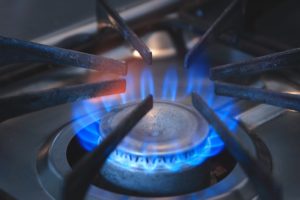The majority of house fires start in the kitchen. Experts estimate that kitchen fires account for at least 50% of all residential fires. If we all put perfect fire safety best practices to work in the kitchen, we might be able to prevent more than half of house fires. Here at Judd Fire Protection, our ultimate goal is to prevent fires from occurring in the first place. With this in mind, we’ve laid out some of the fundamentals of fire safety in the kitchen to keep in mind.

Half of all house fires start in the kitchen. If you keep these tips in mind while cooking, we can prevent devastating kitchen fires!
Keep Kids Out
If you’re a parent with young children, you might want to give some thought to child-proofing your kitchen. No kid should be involved in cooking without close supervision from an adult. When cooking, you might want to keep most of your hot pots and pans on the back burners—that way, a child cannot interfere and cause a fire or burn themselves.
Continually emphasize to your children how dangerous cooking can be without good fire safety practices. There’s no such thing as overkill when it comes to fire safety!
Stay in the Kitchen!
We could prevent countless kitchen fires by just staying in the kitchen while cooking. That way, as soon as a fire happens, you can quickly put it out with a good fire extinguisher. Quick intervention is key to cutting down on fire damage.
Staying in the kitchen is especially important when are frying or broiling food. When simmering or baking food at a low temperature for extended periods of time, this might not be practical. But be sure to check on it often, and always remain on the same floor as your kitchen.
Know How to Put Out a Grease Fire
Every home cook needs to know how to put out a grease fire. Grease fires behave quite differently from ordinary fires. The number one thing you should know is that water will only make a grease fire worse. It will send flaming droplets of hot oil all the way across the room. But you should know only ever to use fire extinguishers on house fires anyway, so that shouldn’t be a problem.
Be Prepared
The number one thing people should do to reduce the danger of kitchen fires is to know what to do if a fire does occur. Even if you follow all your fire safety best practices, there no way to completely eliminate the threat of a fire occurring in your kitchen. You have to know what to do when the unthinkable happens.
Here are some tips:
- Make sure you have the right kind of fire extinguisher on hand, and that it’s not expired
- Test smoke alarms and replace batteries if necessary
- Review evacuation plan with your whole family from different areas in the house
- Know when to call the fire department
By following fire safety best practices in the kitchen, you can dramatically reduce the risk of a kitchen fire. Combine this with sufficient preparedness, and you will keep yourself and your family safe.
Commercial and Residential Fire Prevention from Judd Fire Protection
If you want to ensure your home and business are safe throughout the year, trust Judd Fire Protection, LLC. We have over two decades of experience in designing, installing, inspecting, and repairing residential and commercial fire protection systems. We serve clients throughout Maryland, Pennsylvania, Washington, D.C., Virginia, and West Virginia. If you are interested in finding out more about our services and protecting your home and business, give us a call at 410-871-3480 or contact us online. For more fire safety tips, follow us on Facebook, Twitter, and Pinterest.
